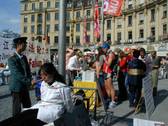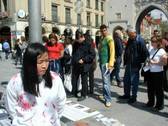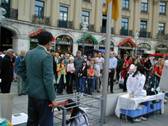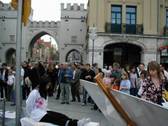On the 30th of April 2005, Falun Gong practitioners from various cities in south Germany, including Passau, Augsburg, Ulm and Munich, gathered at Karlsplatz in Munich. They organised an anti-torture exhibition to commemorate the 6th anniversary of the peaceful appeal by ten thousand Falun Gong practitioners on 25th April 1999.
A young engineer called Daniel stood in the busy centre of Munich holding a plaque in his hands, which read “Forever 4.25”. Behind him hung big banners in both Chinese and German: “Falun Dafa” and “Bring Jiang Zemin to Justice”. Several practitioners quietly demonstrated the Falun Gong exercises next to him.
On the other side of the Falun Gong stall, a live anti-torture exhibition was simulating scenes from a Chinese forced labour camp. A young man in a Chinese police uniform waved an electric baton in his hand. A bloodstained female Falun Gong practitioner was tied to a tiger bench while another lady was locked up in a small cell. The Tiger Bench is a torture where the victim is tied on a narrow wooden or iron bench by the thighs and knees, with hands tied behind the back, then the legs are bent in the opposite direction by adding bricks under the heels. The torture creates excruciating pain. A small cell is a room with just enough space for one person. Since the dimensions of the room are less than 1.5 metres, one cannot stand straight or lie down. It has dirty water on the floor and the walls have nails protruding everywhere. There is no light at all. Victims are thrown barefoot into the cell for months.
The square in Munich was filled with people. Falun Gong practitioners’ anti-torture exhibition soon attracted a huge crowd. Shocked by the scenes, people kept asking practitioners questions and asking for more information. After learning the truth about Falun Gong, many people took the initiative to sign the petition in support of bringing the instigator of the persecution, former Chinese leader Jiang Zemin, to justice and another petition to rescue the family of Jiang Renzheng. Jiang Renzheng is a practitioner who was based in Germany but was recently deported to China by the German Government with his wife and two children. He was sentenced to three years in a forced labour camp and his whereabouts are now unknown.
Before the event, the group of practitioners in Munich discussed the meaning of the famous appeal on April 25th 1999. According to the recollection of a practitioner who took part in “4.25”, at the time everybody went to appeal spontaneously. They genuinely wanted the Chinese Government to understand Falun Gong, and also gave the government a very good chance of establishing an image of progressiveness internationally. The practitioners conducted themselves extremely well. This could not have been achieved through any kind of organisational effort, but only through cultivation.
In the beginning, the attitude of the government had indeed been tolerant. Nearby shops also trusted practitioners a great deal. They would not count the money practitioners paid when selling things to practitioners because they trusted them so much. Trivial as it might seem, this showed the positive impression people held towards Falun Gong at the time. But after the persecution began, the government went to great lengths to slander and disparage Falun Gong. The public were tricked by the communist propaganda and could no longer understand.
 |  |
 |  |
 |  |
* * *
You are welcome to print and circulate all articles published on Clearharmony and their content, but please quote the source.










 more ...
more ...